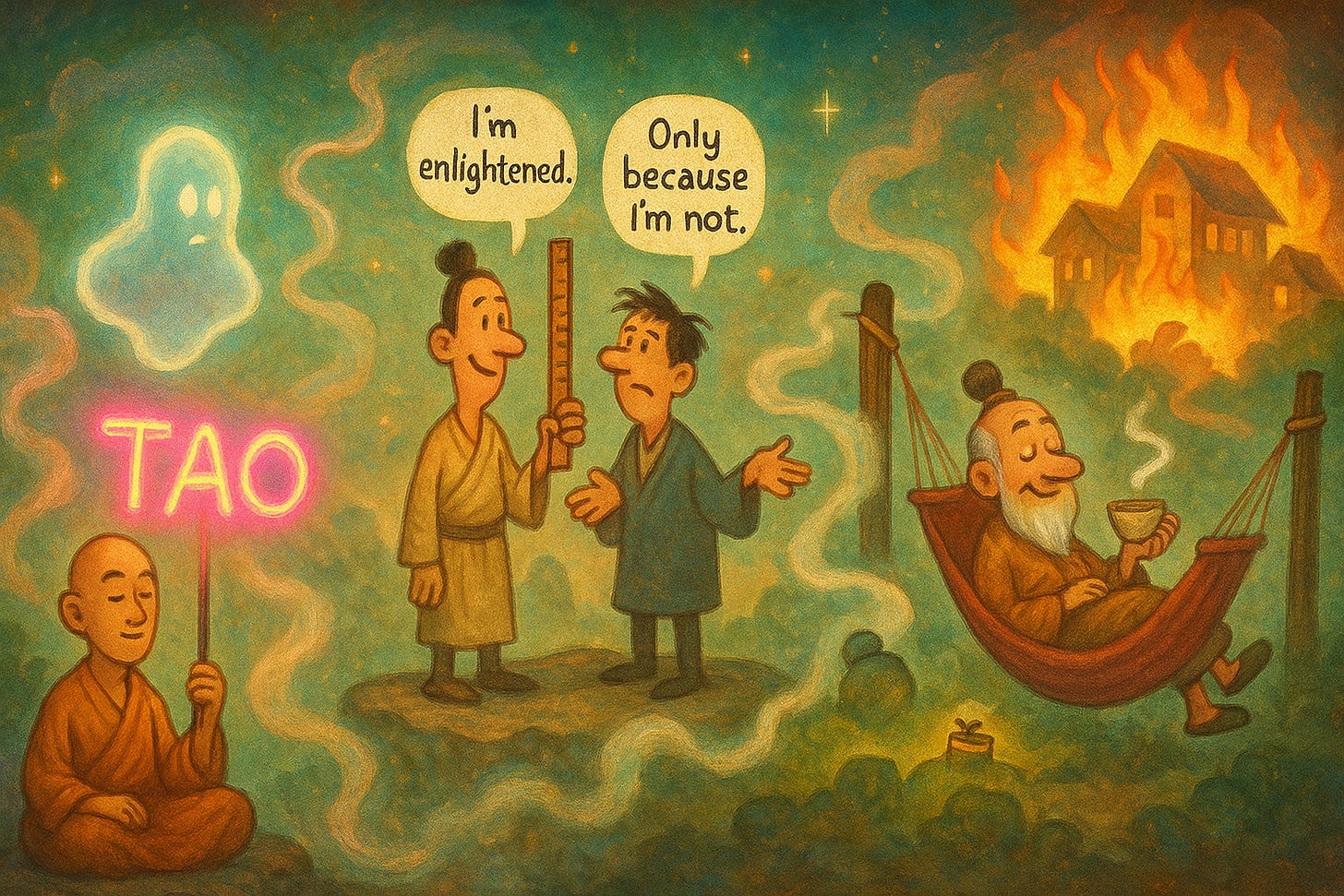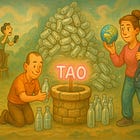Tao Te What Now? (Chapters 1-3)
A slightly unhinged walkthrough of the Tao Te Ching
So you’ve decided to read the Tao Te Ching.
Either you’re seeking peace, chasing enlightenment, trying to out-vibe your therapist, or you just like obscure philosophy that makes you feel smart and dumb at the same time.
Good news: you’re in the right place.
Bad news: it won’t help you get your life together in the way you think it will.
Better news: it might show you that you never had to in the first place.
This ancient Chinese text, written by Laozi around 2,500 years ago, is basically a poetic mic drop about the nature of reality, control, ego, and why trying hard often makes things worse. It’s short, mysterious, non-linear, and aggressively subtle. You won’t get it all on the first read. That’s part of the charm. It’s also part of the test. Which you are not supposed to try to pass.
About This “Cursed” Interpretation
We’re going to go through each chapter, one by one.
Instead of solemn chanting or incense or “sitting with it in silence,”
We’re going to translate it for actual humans with internet-fried brains, executive dysfunction, and a fondness for sarcasm.
Disclaimers:
We love the Tao. We also enjoy poking fun at ourselves while getting deep. That’s the spirit this was written in.
If you're looking for academic accuracy or lineage-specific devotion… this isn’t that.
If you're spiritually curious, allergic to self-serious gurus, and suspicious of people who wear too much linen—welcome home.
Chapter 1
Unnamable, Unknowable, But Definitely Not Your Personal Brand
The first rule of Tao Club is that you can’t talk about Tao Club. The second rule of Tao Club is that if you are talking about Tao, it’s already not Tao.
It is nameless and formless, It’s kind of like an infinite ocean… kind of like a star (and also a black hole)… kinda like the cosmic engine behind everything. But it’s also not like any of those things.
Because once you name it? It’s not infinite anymore, or formless. Naming is how finite things are made: Trees, emails, bad Tinder dates.
So…herein lies the problem and we get to it right out of the gate. You can’t describe the Tao. So.. spoiler alert... the next 80 chapters are also not the Tao.
If you want to really understand it, you’ve got to stop trying to “figure it out.” Just... let it be.
If you free yourself from wanting to find it, you’ll see it in everything.
If you chase it, you’ll only see what it isn’t.
But what it is, and what it isn’t, are both the Tao.
We call that whole messy, beautiful paradox “the Mystery.” And the deepest part of that Mystery? It’s basically the secret doorway into all the subtle magic of life. If you’re into that sort of thing.
tl; dr; Stop trying. If you’re chasing it, naming it, or trying to “get it”—you already missed it. Just be still and let it reveal itself… or don’t. Either way, it’s still there, not caring.
Chapter 2
Congrats, You Only Know What Tall Is Because Short Exists
Everyone knows what “pretty” is. Why? Because “ugly” exists. Congrats, your brain now runs on comparison mode.
You only know what “skilled” means because you’ve watched someone absolutely butcher a task. (You probably went, “Yikes. Not that guy.”)
Same deal with everything: Existence vs. Non-Existence, Hard vs. Easy Tall vs. Short High vs. Low, TikTok vs. Silence Before vs. After
Everything only “means” something Because it’s not the other thing. That’s how your little labeling mind plays.
Now, the sage, this enlightened, no-ego, chill human. He runs life without forcing it. He teaches without Ted Talks. He leads without PowerPoint. He does the thing without doing the thing.
Life just happens. Stuff grows. No one screams “Look at me!” Nobody slaps their name on the process. No humblebragging. No likes. No existential meltdown if it goes unnoticed.
And when the job’s done? He just walks away. No mic drop. No “as per my last email.” No statue in the lobby.
And that quiet, non-grabby, background-level grace? That’s real power. And it doesn’t burn out.
tl; dr; Everything we understand—beauty, skill, success—only exists because of its opposite, so the wise person lets things unfold naturally without needing to force, label, or take credit.
Chapter 3
How to Run a Civilization Without Accidentally Inventing Late Capitalism.
If you keep hyping up "super talented people," you accidentally start a national Hunger Games of ego and competition.
If you make rare, shiny stuff super valuable, don’t be shocked when people start stealing it. (Don’t cry when the Fabergé egg goes missing, Susan.)
If you wave temptation in front of everyone, guess what? Their brains go haywire. Desire overload. Chaos ensues.
So what does the wise leader do?
He makes sure people’s minds aren’t jam-packed with nonsense, but their bellies are full. He chills out their ego-drives and makes sure their bodies are strong enough to actually live life.
He helps people stay grounded. Not craving, not overthinking, not trying to be the main character.
And if someone starts flexing their cleverness? He gently steers them away from acting on it like they know better than the Tao.
Because when nobody’s scrambling to be “the best” or “the smartest” or “the richest”… things kind of... run themselves. Like a society that forgot how to be dysfunctional.
tl;dr; Laozi just endorsed strong bones, quiet minds, full stomachs, and chill vibes. Which tbh sounds like the tagline for a very enlightened CrossFit gym.


